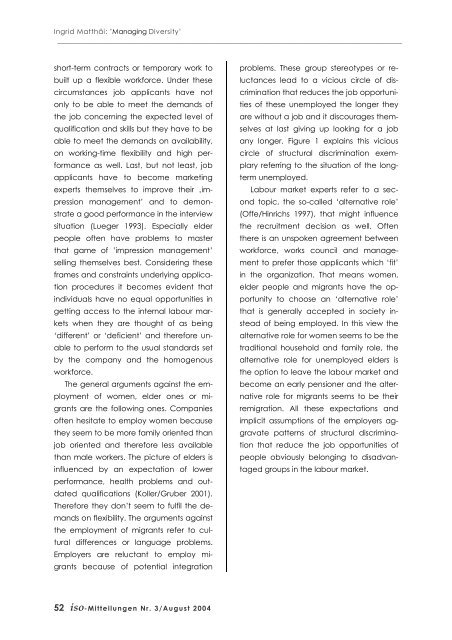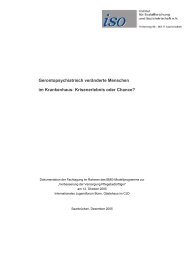iso-NEWS - Institut für Sozialforschung und Sozialwirtschaft eV
iso-NEWS - Institut für Sozialforschung und Sozialwirtschaft eV
iso-NEWS - Institut für Sozialforschung und Sozialwirtschaft eV
Erfolgreiche ePaper selbst erstellen
Machen Sie aus Ihren PDF Publikationen ein blätterbares Flipbook mit unserer einzigartigen Google optimierten e-Paper Software.
Ingrid Matthäi: ’Managing Diversity’<br />
__________________________________________________________________________________________<br />
short-term contracts or temporary work to<br />
built up a flexible workforce. Under these<br />
circumstances job applicants have not<br />
only to be able to meet the demands of<br />
the job concerning the expected level of<br />
qualification and skills but they have to be<br />
able to meet the demands on availability,<br />
on working-time flexibility and high performance<br />
as well. Last, but not least, job<br />
applicants have to become marketing<br />
experts themselves to improve their ‚impression<br />
management’ and to demonstrate<br />
a good performance in the interview<br />
situation (Lueger 1993). Especially elder<br />
people often have problems to master<br />
that game of ’impression management’<br />
selling themselves best. Considering these<br />
frames and constraints <strong>und</strong>erlying application<br />
procedures it becomes evident that<br />
individuals have no equal opportunities in<br />
getting access to the internal labour markets<br />
when they are thought of as being<br />
‘different’ or ‘deficient’ and therefore unable<br />
to perform to the usual standards set<br />
by the company and the homogenous<br />
workforce.<br />
The general arguments against the employment<br />
of women, elder ones or migrants<br />
are the following ones. Companies<br />
often hesitate to employ women because<br />
they seem to be more family oriented than<br />
job oriented and therefore less available<br />
than male workers. The picture of elders is<br />
influenced by an expectation of lower<br />
performance, health problems and outdated<br />
qualifications (Koller/Gruber 2001).<br />
Therefore they don’t seem to fulfil the demands<br />
on flexibility. The arguments against<br />
the employment of migrants refer to cultural<br />
differences or language problems.<br />
Employers are reluctant to employ migrants<br />
because of potential integration<br />
52<br />
<strong>iso</strong>-Mitteilungen Nr. 3/August 2004<br />
problems. These group stereotypes or reluctances<br />
lead to a vicious circle of discrimination<br />
that reduces the job opportunities<br />
of these unemployed the longer they<br />
are without a job and it discourages themselves<br />
at last giving up looking for a job<br />
any longer. Figure 1 explains this vicious<br />
circle of structural discrimination exemplary<br />
referring to the situation of the longterm<br />
unemployed.<br />
Labour market experts refer to a second<br />
topic, the so-called ‘alternative role’<br />
(Offe/Hinrichs 1997), that might influence<br />
the recruitment decision as well. Often<br />
there is an unspoken agreement between<br />
workforce, works council and management<br />
to prefer those applicants which ‘fit’<br />
in the organization. That means women,<br />
elder people and migrants have the opportunity<br />
to choose an ‘alternative role’<br />
that is generally accepted in society instead<br />
of being employed. In this view the<br />
alternative role for women seems to be the<br />
traditional household and family role, the<br />
alternative role for unemployed elders is<br />
the option to leave the labour market and<br />
become an early pensioner and the alternative<br />
role for migrants seems to be their<br />
remigration. All these expectations and<br />
implicit assumptions of the employers aggravate<br />
patterns of structural discrimination<br />
that reduce the job opportunities of<br />
people obviously belonging to disadvantaged<br />
groups in the labour market.









